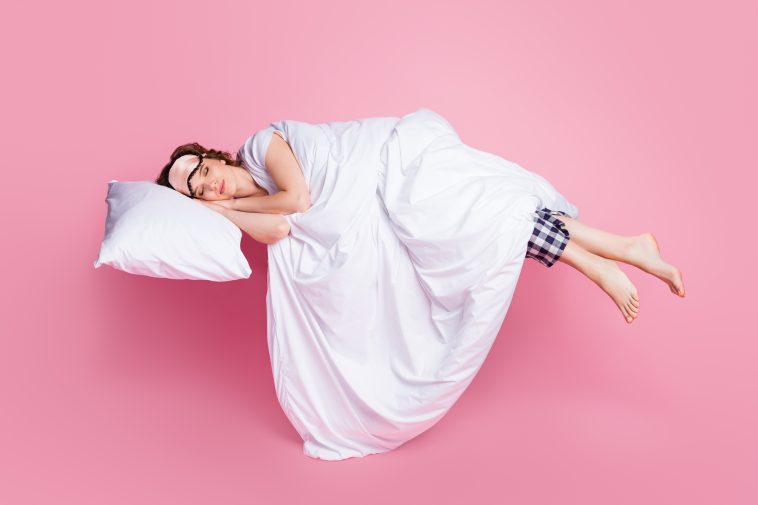Not getting a good night’s sleep isn’t just irritating. If left untreated, it can lead to chronic health problems later in life. But don’t worry, you might not need to jump to prescription medications to fix this problem, there are natural ways to improve your sleep. For some, all it can take is adjusting some of your daily habits to help you maintain a better, sounder sleep.
Improve Your Sleep with Your Food and Diet
What you eat every day can have a drastic effect on how you sleep at night. Caffeine is a given for many in the morning but can leave you feeling restless and anxious come bedtime. Consider cutting it out of your diet to improve your quality of sleep over time.
Also, consider adding foods with sleep-promoting properties. Magnesium is a natural sedative, so consuming foods that are rich in this mineral can help improve sleep as well. Foods that are high in magnesium tend to be dark leafy vegetables, almonds, seeds, whole grains, and bananas. This smoothie recipe has lots of magnesium-rich foods and is a delicious way to improve your sleep while packing a nutritional punch.
Cut Back on the Booze
The relationship between alcohol and sleep is a tricky one. Having a few glasses of wine at night is a common way to unwind after a long day. Many people claim to feel sleepy after drinking alcohol because alcohol is technically a sedative. However, alcohol actually disrupts your REM cycle because it causes brain activity to slow down. Not falling into regular REM cycle sleep can cause insomnia and sleep disruptions, leaving you feeling groggy and tired the next day.
Ditch the nightcap if you want to wake up feeling refreshed.
Read more: 5 Big Habits That Hurt Your Skin
Natural Boosts
Melatonin is a hormone produced in the pineal gland of your brain. It is responsible for telling your body when it’s time to fall asleep and when it’s time to wake up. Melatonin levels differ from person to person and usually depend on how much light you get per day. Research shows that taking melatonin supplements can help people with insomnia fall asleep faster and also stay asleep throughout the night.
Chamomile and lavender are well-known for their calming properties and are often recommended for people looking for a little help with insomnia. A warming cup of tea, a soothing eye pillow, or an essential oil diffuser can all offer the relaxing benefits you’re looking for.
An herb you might consider using is kratom. Kratom comes from a tree native to Southeast Asia and could offer a sense of calm, allowing you to wander off to dreamland with less worry. To quiet your mind, try red vein kratom for some extra relaxation so you can sleep better.
Meditation
Meditation is the practice of mind and body relaxation. It’s a popular option for people who have trouble sleeping because it’s completely free — all it takes is a little focus. Meditating before bed can help calm you down, making you more likely to fall asleep. Consider following along with deep breathing techniques to slow down your heart rate, which lowers the levels of cortisol in your body. Cortisol is also known as the stress hormone, so by managing your heart rate, you are producing less stress.
Practicing mindfulness and meditation and taking control of your thoughts can be a great way to reduce anxieties that may creep up before bedtime. If you need a little guidance, there are many apps, podcasts, and videos that teach meditation and breathing techniques.
Control the Environment
The space you sleep in can have a huge effect on the quality of rest you’re getting. The best kinds of environments for sleeping in are cooler, darker ones. Consider turning the heat down to a slightly colder temperature at night and purchasing blinds that block out any light.
Everyone is different — some people can only sleep in total silence, while others need some background noise to drift off to. If you’re in the latter group, turning on a noise machine with rain or ocean sounds. This can aid with falling and staying asleep.
We know it’s common for most people to scroll on their phone before bedtime, but staring at bright screens is not conducive to good sleep. Consider introducing a ‘no screen time’ hour before you want to sleep to help your brain wind down.
Improve Your Sleep with Regular Exercise
It’s annoying, but it’s true. Getting regular exercise has been scientifically proven to greatly improve your sleep, your overall mood, and your overall health. But don’t worry — you don’t need to start intensive training to reap the benefits of exercise. Even moderate workouts just a few times a week have been shown to help in all the areas mentioned before.
Try taking a brisk 30-minute walk every day, or go for a jog a few times a week. You don’t need a gym membership to start moving around. Getting your heart rate pumping for a bit every day can help lower the amount of time it takes to fall asleep and stay asleep. It’s very important to get back in touch with your body to maintain a healthy lifestyle.
Start Sleeping Better Today
You don’t need heavy prescriptions to get a good night’s sleep. All you need to do is change some of your habits, like cutting back on alcohol, watching what you eat, and getting regular exercise. Meditation and supplements can help you fall asleep faster and stay asleep longer, too. Find the option that works best for you and stick with it.



